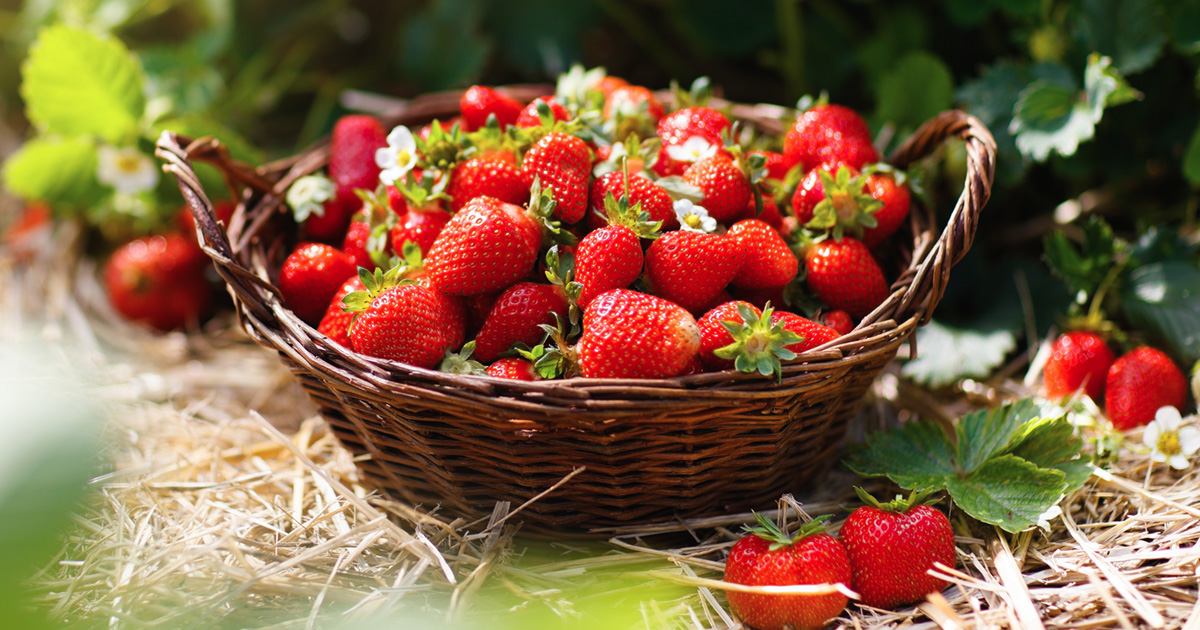
Though the strawberry seems as American as the fourth of July, the fresh strawberries available in the United States today are actually a hybrid of a North American and Chilean cultivar. This bright, red fruit has its seeds on the outside and is a familiar sight at grocery stores all over the world. As popular a flavor as strawberry is, however, its familiar sweet flavor is only part of what makes it enticing; the strawberry is also an extremely healthy food that is packed with nutrients yet low in calories.
For such a small berry, the strawberry has a surprising amount of beneficial nutrients. In addition to manganese and other minerals, strawberries are also a great source of Vitamin C. Though people often associate orange juice with vitamin C, a handful of strawberries has nearly the same vitamin C content as an entire orange. Strawberries also have modest amounts of other useful nutrients like folate, vitamin B6, vitamin K, vitamin A, and unsaturated fatty acids (found in the seed oil).
Like other fruits and healthy foods, the nutritional content of strawberries is well known by consumers but not necessarily understood in a practical sense. Being high in vitamin C sounds like a good thing, but what benefits do humans get from consuming foods that contain vitamin C? Below is a list of some of the nutrients found in strawberries with a description of their benefits to the human body:
Beyond the health benefits of some of these individual components, strawberries have been known to have a series of overall health benefits. In fact, some studies have indicated that the anthocyanins in berries (responsible for the red pigment) may improve heart health. Moreover, strawberry consumption (and consumption of berries in general) has been linked to lower risk of death from heart disease as well as improved cholesterol and blood pressure. Also, the antioxidant content in strawberries may reduce inflammation throughout the body.
Though strawberries are loaded with many valuable nutrients as noted above, the vitamin C content is one of their greatest assets. As with all essential nutrients, the Food and Drug Administration (FDA) makes recommendations for how much of that nutrient should be consumed every day. The baseline daily value is 60 mg of vitamin C, but that amount should be greater depending on age and gender; pregnant women, for instance, should be getting 85 mg per day while breastfeeding women should consume 120 mg. One serving of strawberries (3.5 ounces) has approximately 58 mg—over 70% of the recommended daily value!
It’s important to note that the nutritional value of vitamin C degrades over time and after exposure to heat. This is why fresh fruits and veggies have generally higher nutritional value than their cooked counterparts; the same 3.5 ounce serving of strawberries will only have half the vitamin C content, for example. Also, strawberries aren’t the only fruit that has a lot of vitamin C; bell peppers, guava, citrus fruits (like oranges or grapefruit), papaya, brussels sprouts, and kiwifruit all have substantial vitamin C content.
As wonderfully healthy as strawberries are, there are some people who have been known to develop an allergic reaction. Though the specific cause of this strawberry allergy is not fully understood, research suggests it may be related to the red anthocyanin pigment. Symptoms of a strawberry allergy include hives, headaches, and swelling in the face or mouth. The reaction, known as anaphylaxis, can be mild or severe; in cases of extreme allergy, anaphylaxis can result in trouble breathing, low blood pressure, or even death. Doctors estimate that 6-9% of people suffer from a strawberry allergy.
With excellent flavor and tremendous health benefits, strawberries are an incredibly valuable component of a variety of food products. At FruitSmart, providing high quality ingredients for any product need is the core of what we do and who we are. Strawberry juice concentrate works well for hard seltzers, cocktail mixes, kombucha, or many other kinds of beverages. Strawberry seeds, seed oils, and seed powders are similarly useful for nutraceuticals, baked goods, snacks, or personal care products.
Our strawberry concentrates, essences, and seed ingredients are just one example of the many excellent products provided by FruitSmart. Yet FruitSmart is more than just a catalog of food components; we see ourselves as a partner-oriented provider of custom food and beverage solutions. If you would like to learn more about our strawberry-related products or any of our other fruits and vegetables, please contact us today to learn more.
